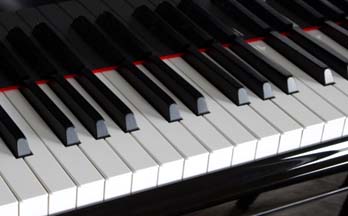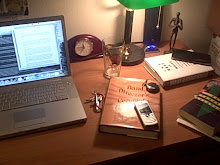This post is part of a blog project on student teaching hosted at So You Want to Teach.
However, everything about the other two periods was left to me. What to rehearse, and how. And more importantly, he wants me to rehearse the kids, even his audition ensemble, not just run them through their music. We only have a few weeks and he just dropped new music on them this Wednesday. This is the difference between being a conductor and being a teacher.
One small problem: I've never even seen a lesson plan for an ensemble course. I've put plenty together for the Music Theory course I interned in last year, but here I'm doing everything backwards. I've none of the credential programs under my belt, but have over a year's worth of observation and teaching experience in this same classroom. I fretted about this for a while until I realized, I put a lesson plan together before I step up to the podium every day.
In preparing my score, I go through it, listen to a recording endlessly, or more often, sing it (much to my brother's annoyance). Anywhere I trip in singing it, I drop a sticky note. Anywhere I think a problem will occur, sticky note - usually covered with barely decipherable scribbles. These aren't notes to myself about conducting, they're to use to help direct a rehearsal. Anytime I come up with something to say about the piece that would help the kids in artistically shaping the piece - like "With Quiet Courage" being about a mother, who was later diagnosed with cancer, exhibiting the courage to face down anything and everything life has to offer without flinching, instead of the brash heroic deeds with which we generally associate courage - that's a sticky note.
Anytime we stumble in rehearsal, and I mention something to correct it, I go back through rehearsal after class and write down everything, and stick it in my score. After a while, if things are no longer an issue and the kids routinely get it right, the sticky note gets tossed.
Right now, my score for Chorale and Toccata by Jack Stamp is covered to the point where I almost can't read the music. Almost. They just got it on Wednesday, and hopefully in three weeks, the score will be clean and ready for the Festivity of Bands. Tomorrow I'm going to come in and pull down a few of his books on "Teaching Music through Performance in Band" and find the pieces we're playing to get another point of view on what's important in the piece, and a few more sticky notes will go into it.
The only other aspect is organization and pacing of the rehearsal, something I'm still working on perfecting. The pieces will be on the board before the class gets in, something my director doesn't often do and we'll tear through them with a lingering promise of giving the kids "the rest of the period off" if we accomplish everything I want. Which means maybe five minutes out of 50, but they won't know that. It's Friday, their teacher isn't there, they'll expect a bit of a break, which means they'll work for it. I just need to keep their instruments on their lips as long as possible. I say on their lips because I have ten trumpets and seven trombones in my back row in one period. If you work with a school band, that actually means something.
My lesson plan needs to be modular and flexible, it's not seventh grade science or 9th grade english. Sometimes I wish it were, other times I'm glad it isn't. I have to adapt what I'm teaching to what they need to work on, what they're giving me and how it measures up to what I expect. Now, that sounds just like any other class, but I'm doing it beat by beat, second by second, and not chapter by chapter or test by test.
I have great respect for the music teachers I work with, after trying to emulate what they do for just two periods. Different music for each class. I work with a teacher whose mutters a litany with pride: "I teach 7 sections of 6 classes in 5 classrooms. I have 4 bosses at 3 schools, and I commute 2 hours a day for 1 job." After years of doing this, they just fall on their feet, as if they were airdropped onto the podium ready to go and can rehearse without too much preparation. But I need my sticky notes and an overarching plan, so here we go:
6th period: Symphonic Band. Theme for the day: LISTEN!
Warm up, tune.
Masada, the first fast part. I don't have the score with me.
Really tune.
Run the Times Square 1944 section towards the end where it pits 4 against 3, take them through it slowly, which will hamper their ability to match up, force them through it and speed up. Spend no more than 6 minutes doing so.
NEW MUSIC. Chorale and Toccata. Not technically new, they've read it once, and I'm sure my bass section has been going nuts. Skip the showery entrance straight to the beautiful bassoon/english horn solo. Normally, I wouldn't make the kids sit through a solo section, but it's important that the trumpets listen to the soloists. Make sure the soloists understand that they have a give and take dynamic in this duet. One pushes and the other gives, then pushes back. The trumpets come in right after and need to match not just the dynamics, but color of the solo. Something hard to do pitting 10 trumpets against two double reeds. together they need to bring out the warmth of their lower register, while sounding like one trumpet, over a hill somewhere for a measure or two then growing. The rest of the band needs to notice the dynamic (not volume, but dynamic) between the soloists and reiterate that when accompanying
the trumpets.
So those four bars were a mouthful, that's why I generally speak in music instead of english at the podium. Tragically, I can't sing for you here. I know my timpanist was practicing this piece at lunch today, and I'm sure my bass clarinets are rocking the toccata and are ready for tomorrow.
7th Period.
Tune
Longford III.
New Music. (Mostly New) With Quiet Courage. The piece is thickly scored, so the lack of horns and oboe in my concert band is not going to be a problem (though always disheartening). The problem is going to be that without varying instrumentation, the piece starts to sound cyclical and isn't interesting. I'm going to try and combat that by focusing on the countermelodies and bringing them out more, even to the point of absurdity if it will bring about contrast in the piece. It's likely too easy for them, and we won't play it past tomorrow, but it's a really pretty piece, and they need to focus on intonation. They have enough technically difficult stuff on their plate and sometimes they're so focused on their fingers, they don't listen to what they sound like. This piece will force that.
Then come the shape note pieces, Geneva Variations and Rhapsody on American Shape Note Melodies. The first in my opinion is too hard for the kids, the latter, too easy. We'll run them and see what they like and don't like about each piece and what they can accomplish.
My brother just popped in to ask me a favor: if I'm going to be listening to the music I make my kids play all night, force them to play something awesome like the theme to Jurassic Park. As cheesy as it sounds, it's not a bad idea, especially for our band trip to San Diego this May. I at least started playing the soundtrack for his benefit.
I've got a bit of system down, but I really don't know how anyone else does it. My lesson plan for tomorrow? Attempt to topple my biggest challenge: shut up long enough that the kids are listening to themselves instead of me. I hope I can pull it off.


